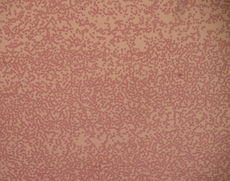- Neutropenia
-
Neutropenia Classification and external resources
Blood film with a striking absence of neutrophils, leaving only red blood cells and plateletsICD-10 D70 ICD-9 288.0 DiseasesDB 8994 eMedicine med/1640 MeSH D009503 Neutropenia, from Latin prefix neutro- (neither, for neutral staining) and Greek suffix -πενία (deficiency), is a hematological disorder characterized by an abnormally low number of neutrophils, the most important type of white blood cell. Neutrophils usually make up 50-70% of circulating white blood cells and serve as the primary defense against infections by destroying bacteria in the blood. Hence, patients with neutropenia are more susceptible to bacterial infections and, without prompt medical attention, the condition may become life-threatening (neutropenic sepsis).
Neutropenia can be acute or chronic depending on the duration of the illness. A patient has chronic neutropenia if the condition lasts for longer than three months. It is sometimes used interchangeably with the term leukopenia ("deficit in the number of white blood cells"), as neutrophils are the most abundant leukocytes, but neutropenia is more properly considered a subset of leukopenia as a whole.
There are numerous causes of neutropenia that can roughly be divided between either problems in the production of the cells by the bone marrow and destruction of the cells elsewhere in the body. Treatment depends on the nature of the cause, and emphasis is placed on the prevention and treatment of infection.
Contents
Classification
There are three general guidelines used to classify the severity of neutropenia based on the absolute neutrophil count (ANC) measured in cells per microliter of blood:[1]
- Mild neutropenia (1000 <= ANC < 1500) — minimal risk of infection
- Moderate neutropenia (500 <= ANC < 1000) — moderate risk of infection
- Severe neutropenia (ANC < 500) — severe risk of infection.
Signs and symptoms
Neutropenia can go undetected, but is generally discovered when a patient has developed severe infections or sepsis. Some common infections can take an unexpected course in neutropenic patients; formation of pus, for example, can be notably absent, as this requires circulating neutrophil granulocytes.
Some common symptoms of neutropenia include fevers and frequent infections. These infections can result in conditions such as mouth ulcers, diarrhea, a burning sensation when urinating, unusual redness, pain, or swelling around a wound, or a sore throat.
Diagnosis
Low neutrophil counts are detected on a full blood count. Generally, other investigations are required to arrive at the right diagnosis. When the diagnosis is uncertain, or serious causes are suspected, bone marrow biopsy is often necessary.
Other investigations commonly performed: serial neutrophil counts for suspected cyclic neutropenia, tests for antineutrophil antibodies, autoantibody screen and investigations for systemic lupus erythematosus, vitamin B12 and folate assays and acidified serum (Ham's) test.[2]
Causes
Causes can be divided into the following groups:
- Decreased production in the bone marrow due to:
- aplastic anemia
- arsenic poisoning[3]
- cancer, particularly blood cancers
- certain medications
- hereditary disorders (e.g. congenital neutropenia, cyclic neutropenia)
- radiation
- Vitamin B12, folate or copper deficiency.
- Increased destruction:
- autoimmune neutropenia.
- chemotherapy treatments, such as for cancer and autoimmune diseases
- Marginalisation and sequestration:
- Medications
- such a Flecainide (a class 1C cardiac anti-arrhythmic drug)
There is often a mild neutropenia in viral infections. Additionally, there is a condition called morning pseudoneutropenia which might be a side effect of certain anti-psychotic medications.
Therapy
There is no ideal therapy for neutropenia, but recombinant G-CSF (granulocyte-colony stimulating factor) such as filgrastim can be effective in chemotherapy patients, in patients with congenital forms of neutropenia including severe congenital neutropenia, autosomal recessive Kostmann's syndrome, cyclic neutropenia, and myelokathexis.
History
The relationship between a low neutrophil count and increased risk of infection was first demonstrated in patients with leukemia.[4]
Diet
Guidelines given to neutropenic patients regarding diet are currently being studied[5]. As of 2011, the Neutropenic Diet Guideline includes the following recommendations[6]:
- Avoid raw vegetables and fruit.
- Avoid take-out foods and fast foods and fountain drinks.
- Avoid aged cheese.
- Cook all produce to well done. Eggs must be hard-boiled.
- Avoid deli meats.
- No raw nuts, nuts roasted in shell, or freshly ground nutbutters from a healthfood store.
- No well water
- No yogurt
See also
References
- ^ Hsieh MM, Everhart JE, Byrd-Holt DD, Tisdale JF, Rodgers GP (Apr 2007). "Prevalence of neutropenia in the U.S. population: age, sex, smoking status, and ethnic differences". Ann. Intern. Med. 146 (7): 486–92. ISSN 0003-4819. PMID 17404350. http://www.annals.org/cgi/content/abstract/146/7/486.
- ^ Levene, Malcolm I.; Lewis, S. M.; Bain, Barbara J.; Imelda Bates (2001). Dacie & Lewis Practical Haematology. London: W B Saunders. pp. 586. ISBN 0-443-06377-X.
- ^ American Society of Hematology Trisenox® (arsenic trioxide) in Patients with Myelodysplastic Syndromes (MDS): Preliminary Results of a Phase I/II Study. Norbert Vey, MD1,*, Francois Dreyfus, MD1,*, Agnes Guerci, MD1,*, Pierre Fenaux, MD1, Herve Dombret, MD1, Alan K. Burnett, MD2, Andre Bosly, MD3, Walter Feremans, MD4, David T. Bowen, MD5 and Marja Heiskala, MD6
- ^ Bodey GP, Buckley M, Sathe YS, Freireich EJ (Feb 1966). "Quantitative relationships between circulating leukocytes and infection in patients with acute leukemia". Ann. Intern. Med. 64 (2): 328–40. ISSN 0003-4819. PMID 5216294.
- ^ http://theoncologist.alphamedpress.org/content/16/5/704.abstract Jubelirer, S., The Benefit of the Neutropenic Diet: Fact or Fiction?, Oncologist, 2011;16(5):704-7. Epub 6 April 2011
- ^ http://clinicaltrials.gov/ct2/show/NCT00726934 The Effectiveness of the Neutropenic Diet in Pediatric Oncology Patients, Montefiore Medical Center, Last updated 4 March 2010, Accessed 15 June 2011.
External links
Hematologic disease: Monocyte and granulocyte disease (CFU-GM/CFU-Baso/CFU-Eos), including immunodeficiency (D70-D71, 288) Monocytes/
macrophages↑↓Granulocytes ↑↓PBD Categories:- Monocyte and granulocyte disorders
Wikimedia Foundation. 2010.

